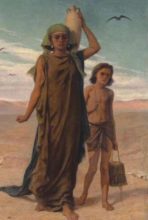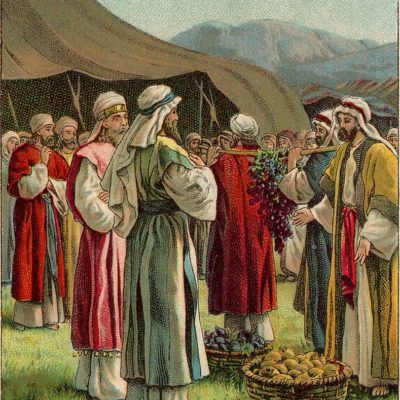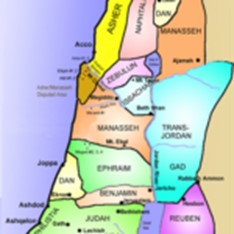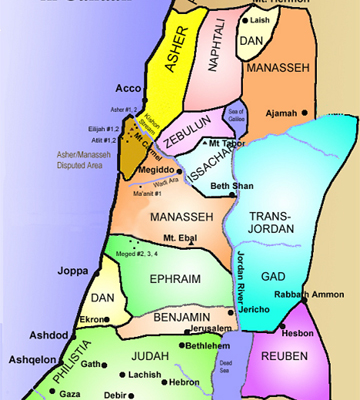Hagar The Egyptian Handmaid to Sarah

Hagar was the Egyptian handmaid to Sarah. This is the story of a slave girl that shows courage. Hagar is considered the mother of the Ishmaelite’s. Hagar was sent out into the desert of Shur with her son by Sarah after the birth of Isaac. Hagar and Ishmael were exhausted, faint and thirsty and afraid they would both die and she called upon the LORD. Her courage can be a comfort to all women as they journey through the deserts in their lives. Genesis 6:1-16
Hagar is an example of women who are excluded or even despised by the people around them. Hagar was an Egyptian girl who was the slave to Sarah, who was the wife of Abraham. Sarah was childless in a society that placed great value to motherhood. Because Sarah was childless and of great age she gave Hagar to Abraham so she could give birth to fulfill the promise of the LORD God.
It is a possibility that Hagar was given to the household of Sarah by the Pharaoh of Egypt. Abraham, the husband of Sarah, took his family down into Egypt because of a great famine in the land. Sarah was beautiful and the Egyptians princes took her to the house of Pharaoh. (Genesis 12:10-20).
It is important to note that Hagar was a household slave and not a concubine in the beginning. If she came as a gift from Pharaoh to appease the LORD God then she would have been a valuable servant. Hagar belonged to Sarah not to Abraham. This is known because Genesis 16:3 tells us that Sarah gave her to her husband Abram to be his wife.
Hagar would bear the child for Sarah and look after it, but it would belong to Sarah and be accepted as the child of Sarah and Abraham. Not the child of Hagar and Abraham. This was a common and acceptable practice in the ancient Near Eastern society.
Hagar conceived son for Abraham. Hagar must have felt superior and honored in the prospect of becoming pregnant by the leader of such a large family. This would have changed her social status dramatically. She would have been the secondary wife to Abraham.
Hagar conceived Ishmael. Sarah had to face daily that she could not give her husband a son and yet her slave girl could. Sarah believed that Hagar did not give her the respect she should have. This must have been very difficult for Abraham; especially since Sarah pointed out that it was his fault and it was a mistake having given Hagar to him.
Hagar felt contempt for Sarah probably because she had done something that Sarah could not do in her old age. Abraham was the tribal leader. Sarah was the ruler of the other tribal women and responsible for them. It was Sarah’s right to treat Hagar severely with her disrespect. Finally Hagar ran away. This shows the courage and determination of Hagar to head toward Egypt through the desert of Shur which is today known as the Negev.
Hagar had fled by a fountain of water in the wilderness, by the fountain of water in the wilderness, by the fountain in the way to Shur. There an angel of the LORD found her. The angel of the LORD asks her where she was going. And Hagar said fleeing from her mistress Sarah.
The angel of the LORD told Hagar to return to thy mistress, and submit herself under Sarah’s hands. The angel of the LORD also said to Hagar that He will multiply her seed exceedingly. Her child would be a son and she should call his name Ismael; because the LORD has heard your affliction. Ismael would be a wild man; his hand will be against every man, and every man’s hand against him; and he shall dwell in the presence of all his brethren. (Genesis 16: 7-12).
Hagar returned to Sarah because now she had a purpose. And angel of the LORD had spoken to her about her destine to rear a child who would have descendants without numbers.
There were still problems between Hagar and Sarah. Once Sarah gave birth to Isaac the balance of power once again resurfaced and Sarah gained top position of the hierarchy. Sarah saw a threat that Isaac would not gain the heir of the first born.
Abraham made a great feast for Isaac the day he was weaned. Sarah demanded that Hagar and Ishmael should be sent away from the tribe so Ishmael would not be the heir with Isaac. Abraham was apprehensive about sending Hagar and Ishmael being sent out to the desert. Genesis 21:8-14.
Abraham rose up early in the morning, and took bread, and a bottle of water, and gave it unto Hagar, putting it on her shoulder, and the child, and sent her away: and she departed, and wandered in the wilderness of Beersheba.
Hagar and Ishmael were alone in the desert and when the supply of water was gone Hagar saw her son begin to die of thirst. There was nothing she could do to save him except place him in the shade of an overhanging bush and wait. Then she went and sat a good way off for she said ‘Do not let me look on the death of the child’. Then she lifted up her voice and called to the LORD for help. Genesis 21:15-16.
The LORD God heard the voice of the lad; and the angel of God called to Hagar out of heaven, and said to Hagar, The LORD had heard her voice and she was to lift up Ismael and hold him in her hand and the LORD would make him a great nation. Hagar saw a well of water and filled the bottle with water and gave it to Ishmael to drink. Genesis 21:17-19.
Ishmael grew and dwelt in the wilderness and became an archer. And he dwelt in the wilderness of Paran; and Hagar took him a wife out of the land of Egypt. Genesis 21:20-21.
Hagar was the mother of the first child born to Abraham. Yet, she never was regarded as such. She was never accepted. She was rejected completely and then banished. Hagar was protected by the LORD against the hatred of Sarah, and the desert, and the threat of death by thirst. Finally Hagar lived as a free woman and her son did grow into a great nation.
Abraham, Hagar and Ismael, according to the Koran, were the ancestors of the Arab nations, and later of the prophet Mohammed. The Koran says that it was at Mecca that God saved Hagar and her son from death by thirst. Muslim ritual reflects the story of Hagar, and every year for thirteen centuries Muslims performing the Hajj have retraced Hagar’s steps as she desperately searched for water. (Green).
Reference:
Green, Khalil. (2008). “An Inner Meaning of Hajj: Hagar as the Spiritual Founder of the Pilgrimage Site.” Suite101. Retrieved September 2011 from: http://www.suite101.com/content/an-inner-meaning-of-hajj-a83021
Cite Article Source
MLA Style Citation:
Holstein, Joanne “Hagar The Egyptian Handmaid to Sarah:.” Becker Bible Studies Library Oct 2014.< https://guidedbiblestudies.com/?p=1788,>.
APA Style Citation:
Holstein, Joanne (2014, October) “Hagar The Egyptian Handmaid to Sarah:.” Becker Bible Studies Library. Retrieved from https://guidedbiblestudies.com/?p=1788,.
Chicago Style Citation:
Holstein, Joanne (2014) “Hagar The Egyptian Handmaid to Sarah:.” Becker Bible Studies Library (October), https://guidedbiblestudies.com/?p=1788, (accessed).
Joanne B. Holstein is a Becker Bible Studies teacher and author of Guided Bible Studies for Hungry Christians. She has received her Master of Science degree in Psychology/Christian Counseling with honors from Liberty University. She is well-known as a counselor to Christian faithful who are struggling with tremendous burden in these difficult times. She is a leading authority on the history of development of the Christian churches and the practices and beliefs of world religions and cults.
Abraham angel of the LORD courage desert of Shur Egyptian Egyptian Handmaid to Sarah fountain of water Hagar Ishmael Ishmaelite Sarah slave girl wilderness

